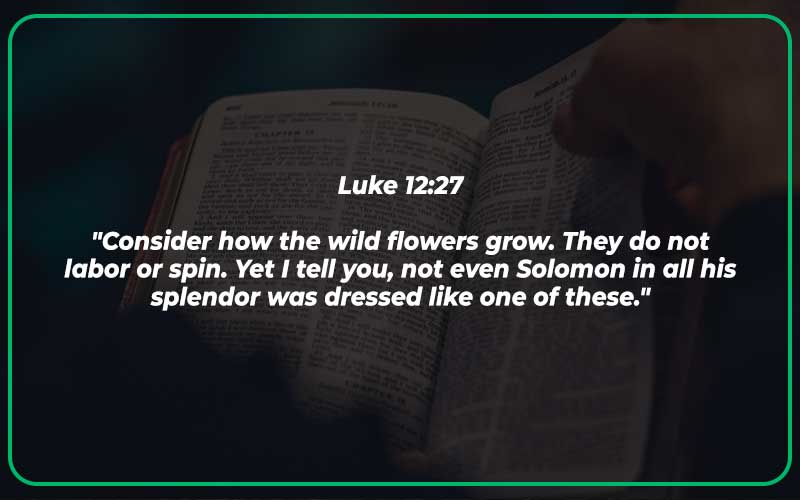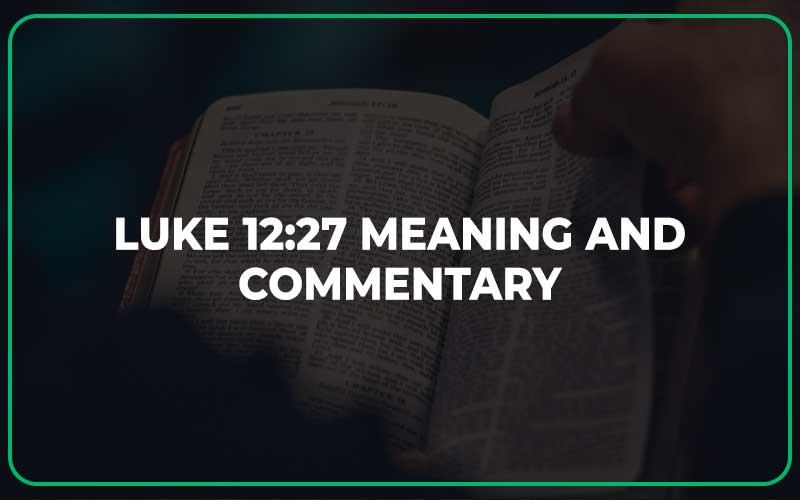Luke 12:27
“Consider how the wild flowers grow. They do not labor or spin. Yet I tell you, not even Solomon in all his splendor was dressed like one of these.”
Luke 12:27 Meaning
In Luke 12:27, Jesus is teaching his disciples about worry and the futility of striving for material possessions. He uses the example of lilies in the field to illustrate a powerful spiritual truth. The verse reminds us of God’s provision and care for us, emphasizing that worrying about our physical needs is unnecessary and detracts from our faith in Him.
Luke 12:27 Commentary and Explanation
In Luke 12:27, Jesus asks us firstly to consider the lilies. In doing so, He invites us to reflect on the simple, yet wondrous aspects of God’s creation. The lilies, with their vibrant colors and delicate petals, showcase the beauty that God has woven into the fabric of our world. In these humble creations, we witness God’s artistic and loving nature, which is a reminder that we are fearfully and wonderfully made (Psalm 139:14).
Furthermore, Jesus highlights that these lily flowers do not toil or spin. This means that unlike humans who work tirelessly to provide for themselves and accumulate wealth, these flowers rely solely on the providence of God. This teaching echoes Matthew 6:26, where Jesus reassures us that if God cares for the birds of the air and the lilies of the field, how much more will He care for us, His beloved children.
The contrast between Solomon, known for his extravagant wealth and splendor, and the wild flowers is striking. Even Solomon, in all his opulence, could not compare to the simple beauty of these flowers. This underscores the idea that material wealth and earthly possessions pale in comparison to the spiritual treasures that God offers us.
So, what can we glean from this verse? It serves as a powerful reminder to trust in God’s provision and sovereignty in our lives. Just as He cares for the flowers and the birds, He cares for us, and we should not worry about our basic needs. Instead, we should seek His kingdom above all else, as emphasized in Matthew 6:33, and trust that He will provide for us according to His riches in glory (Philippians 4:19).
Luke 12:27 encourages us to appreciate the beauty of God’s creation, trust in His providence, and prioritize our relationship with Him over the pursuit of earthly wealth. Let us take this message to heart and find peace and contentment in God’s care and provision for our lives.
Also Read: Judges 11 Meaning and Commentary
Context of Luke 12:27
Luke 12:27 is part of a larger discourse by Jesus where He addresses His disciples and a multitude of people who were gathered around Him. In the preceding verses, Jesus teaches about the futility of worry and the importance of trusting in God’s care. He tells Us not to be anxious about their life, what they will eat or wear, but to seek God’s kingdom.

Breaking Down the Key Parts of Luke 12:27
a) “Consider the lilies” – Jesus instructs His disciples to observe the lilies, emphasizing the beauty and care with which God provides for these flowers.
b) “How they grow” – Jesus highlights the growth and existence of the lilies as evidence of God’s provision. The lilies don’t toil or labor to be beautiful; they simply grow naturally according to God’s design.
c) “They neither toil nor spin” – This phrase emphasizes the contrast between the lilies and the human tendency to strive and worry. The lilies don’t exert effort or engage in anxious activity to provide for their needs.
d) “Yet I tell you, even Solomon in all his glory was not arrayed like one of these” – Jesus points out the surpassing beauty of the lilies, even in comparison to the splendor of King Solomon’s royal garments. This is a powerful statement about God’s attention to detail and care for His creation.
Bible Study on Luke 12:27
This verse invites us to reflect on our own lives and the importance we place on material possessions and physical needs. It challenges us to consider how we prioritize seeking God’s kingdom versus worrying about our earthly needs. We can learn from the lilies, which simply grow and are adorned with beauty by God’s hand.
It is crucial to understand that Jesus is not promoting laziness or a lack of responsibility. Instead, He is urging us to trust in God’s provision while actively seeking His kingdom. Our focus should be on growing spiritually and aligning our lives with God’s purposes, rather than being consumed by worry and striving for material possessions.
As we meditate on this verse, we can ask ourselves the following questions:
- Am I prioritizing seeking God’s kingdom above all else?
- Do I trust in God’s provision for my daily needs?
- How can I grow in faith and reliance on God’s care?
- Am I spending too much time and energy worrying about material possessions?
Biblical Translations of Luke 12:27
Luke 12:27 King James Version (KJV)
“Consider the lilies how they grow: they toil not, they spin not; and yet I say unto you, that Solomon in all his glory was not arrayed like one of these.”
Luke 12:27 English Standard Version (ESV)
“Consider the lilies, how they grow: they neither toil nor spin, yet I tell you, even Solomon in all his glory was not arrayed like one of these.”
Luke 12:27 New American Standard Bible (NASB)
“Consider the lilies, how they grow: they neither labor nor spin; but I tell you, not even Solomon in all his glory clothed himself like one of these.”
Luke 12:27 New King James Version (NKJV)
“Consider the lilies, how they grow: they neither toil nor spin; and yet I say to you, even Solomon in all his glory was not arrayed like one of these.”
Luke 12:27 Christian Standard Bible (CSB)
“Consider how the wildflowers grow: They don’t labor or spin thread. Yet I tell you, not even Solomon in all his splendor was adorned like one of these.”
Luke 12:27 New Living Translation (NLT)
“Look at the lilies and how they grow. They don’t work or make their clothing, yet Solomon in all his glory was not dressed as beautifully as they are.”
Final Thoughts
Luke 12:27 serves as a reminder to put our trust in God’s provision and care for our needs. Just as the lilies in the field are beautifully adorned by His hand, we too are called to seek God’s kingdom and trust in Him.
This verse encourages us to shift our focus from the worries and concerns of this world to the eternal purposes and promises of God. Let us place our faith in Him and find peace and contentment in His loving provision.

